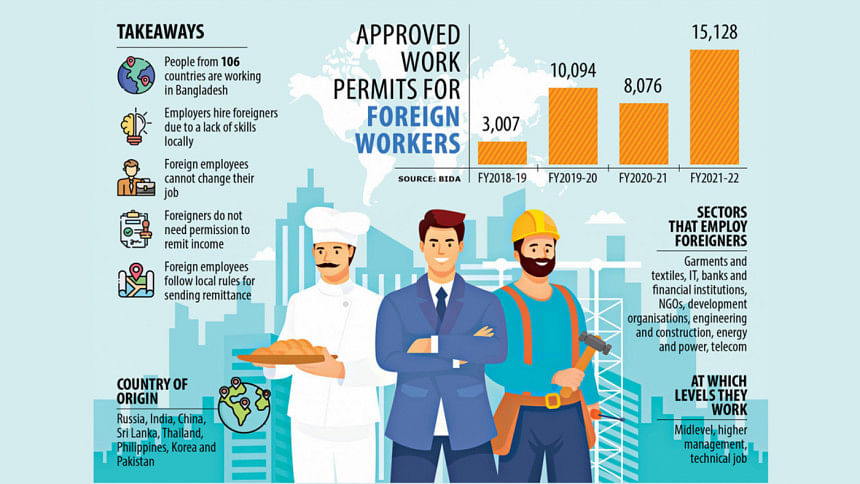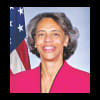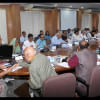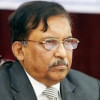Foreigners working in Bangladesh on the rise

The number of foreign nationals working in Bangladesh is rising thanks to expanding industrial activities, a development that also points to the education system's inability to churn out skilled workforce needed to keep the wheel of the economy turning.
Bangladesh has maintained more than 6 per cent growth in the last one decade and the contribution of the industrial sector, particularly the manufacturing segment, to the gross domestic product has increased as the country is gradually becoming an industrial hub from an agrarian economy.
With a view to meeting the demand for skilled workforce, particularly top and mid-level managers, the Bangladesh Investment Development Authority (Bida) alone approved 15,128 applications seeking work permits in 2021-22, up a staggering 87.32 per cent from the previous year.
Of them, 7,790 were new and 7,338 sought renewals, according to the annual report of the state-run investment promotion agency. The applicants came from 106 countries.
The permits are for foreign nationals who are engaged in Bida-registered industrial projects, commercial offices, and other organisations.
Russia sat atop the list of the countries with the highest number of foreign nationals as 3,966 Russians sought fresh work permits or renewals.
India came second with 3,212 applications and China at third with 2,346 applicants.
Russian nationals are employed at the Rooppur Nuclear Power Plant, which is being constructed with funding from Moscow, in Pabna.
Industry insiders say foreigners that are employed in Bangladesh are mainly from industrialised nations or countries that have seen significant industrialisation.
For instance, India, Pakistan, Turkey, Taiwan and Japan have a long history in the textile and garment business and many graduates from the countries possess the skills sought by Bangladeshi industries.
Apart from the Bida, government agencies such as the Bangladesh Economic Zones Authority, the Bangladesh Export Processing Zones Authority, and the NGO Affairs Bureau as well as some ministries granted work permits to foreign nationals working under various projects.
However, it could not be known how many work permits they have approved. The figure for the just-concluded fiscal year has not been published by the Bida as well.
A senior official of the Bida said local industrialists and manufacturers mainly seek work permits in the textile and garment companies. Buying houses in the garment sector recruits a lot of foreign nationals.
Bangladesh is the second-largest garment supplier in the world.
Envoy Legacy, one of the leading textile and garment manufacturers in Bangladesh, is one of the companies that has hired foreign nationals. Currently, eight foreign nationals are employed in its textile unit, whose chief executive officer is a foreigner while others work in the marketing and planning sections.
Kutubuddin Ahmed, chairman of Envoy Legacy, says his company is not interested in employing foreign nationals because a higher salary package has to be offered to them.
"But employing skilled manpower in the technical section is essential. We have hired foreign nationals as local employees can't meet the demand."
Envoy Legacy had employed 25 foreign nationals in the past.
Abdullah Al Mahmud, chairman and managing director of Mahin Group, alleged that many students who graduate from top universities such as Bangladesh University of Engineering and Technology go abroad for jobs and are not keen to work at the factory level in the country.
"On the other hand, skilled foreign nationals reside on the factory premises and render services whenever required."
Asif Ashraf, a director of the Bangladesh Garment Manufacturers and Exporters Association, said Bangladesh has a lot of manpower, but there is a dearth of competent managers.
He said the graduates with a strong educational background and those who graduate from the Institute of Business Administration under the University of Dhaka have always a higher demand in the manufacturing sector.
Md Saiful Islam, president of the Metropolitan Chamber of Commerce and Industry, said although local industries offer better remuneration to competent graduates, they don't work here for a long time and most of them go abroad.
"There is a crisis of skilled manpower across the globe," he said, adding that experienced employees also become citizens of developed countries as well.
Almost all five-star hotels have to appoint foreigners as general managers and main chefs due to an absence of skilled manpower in those positions, said HM Hakim Ali, president of the Bangladesh International Hotel Association.
"In Bangladesh, manpower is not groomed."
Abul Kasem Khan, a former chairman of the Business Initiative Leading Development, a think-tank, said there is a skill gap among employees.
Ahsan H Mansur, executive director of the Policy Research Institute of Bangladesh, thinks the number of foreigners working in Bangladesh would be higher than the permits issued.
"Foreigners employed at government-run projects get work permits. Apart from them, a large number of foreigners come to work with tourist visas, and many of them are employed in the private sector, especially in garments and health."
Mansur said entrepreneurs hire foreigners as they don't get efficient human resources locally.
"There is nothing wrong with it. However, integrity is an issue here since they work without any permits."
The exact data on the remittances sent by foreigners to their home countries is not available. Mansur said outbound remittance could be as high as several billions of dollars.
"This is an economic reality. We will have to accept this unless we find their local alternatives."
The former economist of the International Monetary Fund urged the government to be generous in issuing work permits to encourage foreign professionals to work legally.
"This will also ensure revenues for the government in the form of income taxes."
He said any grey market operation is basically a result of regulatory constraint and suggested authorities collect taxes during the issuance of work permits.


 For all latest news, follow The Daily Star's Google News channel.
For all latest news, follow The Daily Star's Google News channel. 








Comments